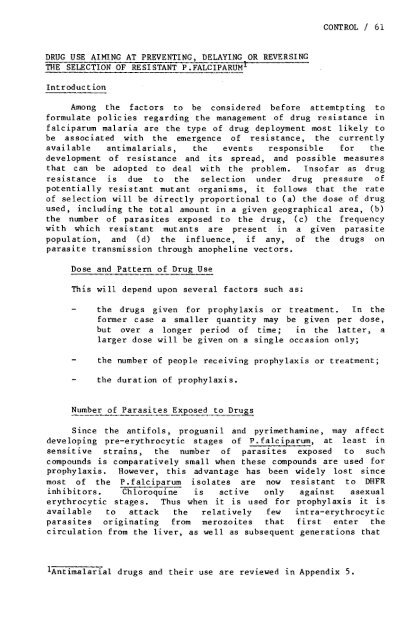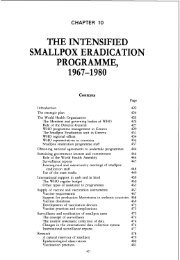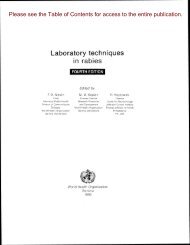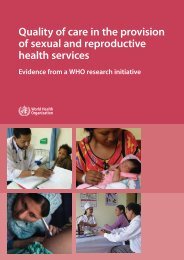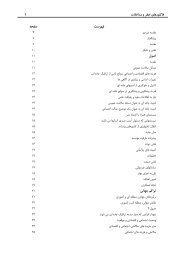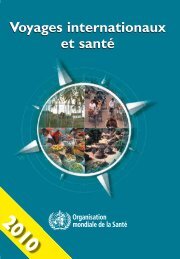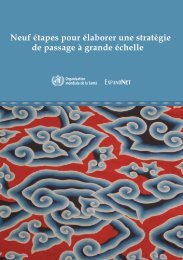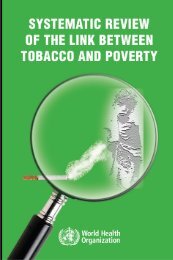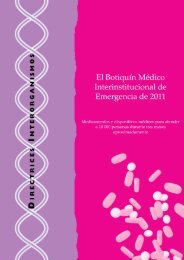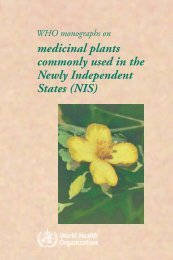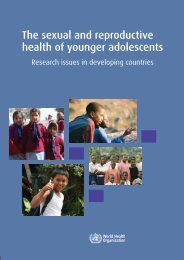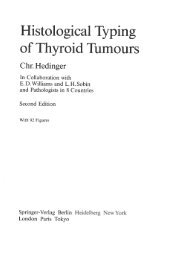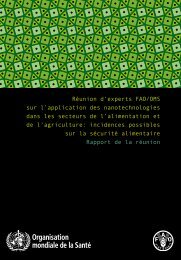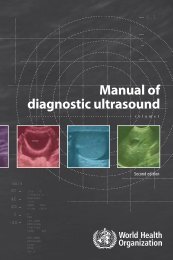Drug-Resistant Malaria - libdoc.who.int - World Health Organization
Drug-Resistant Malaria - libdoc.who.int - World Health Organization
Drug-Resistant Malaria - libdoc.who.int - World Health Organization
You also want an ePaper? Increase the reach of your titles
YUMPU automatically turns print PDFs into web optimized ePapers that Google loves.
CONTROL / 61<br />
DRUG USE AIMING AT PREVENTING, DELAYING OR REVERSING<br />
THE SELECTION OF RESISTANT P.FALCIPARUM1<br />
Introduction<br />
Among the factors to be considered before attemtpting to<br />
formulate policies regarding the management of drug resistance 1n<br />
falciparum malaria are the type of drug deployment most likely to<br />
be associated with the emergence of resistance, the currently<br />
available antimalarials, the events responsible for the<br />
development of resistance and its spread, and possible measures<br />
that can be adopted to deal with the problem. Insofar as drug<br />
resistance is due to the selection under drug pressure of<br />
potentially resistant mutant organisms, it follows that the rate<br />
of selection will be directly proportional to (a) the dose of drug<br />
used, including the total amount in a given geographical area, Cb)<br />
the number of parasites exposed to the drug, (c) the frequency<br />
with which resistant mutants are present in a given parasite<br />
population, and (d) the influence, if any, of the drugs on<br />
parasite transmission through anopheline vectors.<br />
Dose and Pattern of <strong>Drug</strong> Use<br />
This will depend upon several factors such as:<br />
the drugs given for prophylaxis or treatment. In the<br />
former case a smaller quantity may be given per dose,<br />
but over a longer period of time; in the latter, a<br />
larger dose will be given on a single occasion only;<br />
the number of people receiving prophylaxis or treatment;<br />
the duration of prophylaxis.<br />
Since the antifols, proguanil and pyrimethamine, may affect<br />
developing pre-erythrocytic stages of P. falciparum, at least in<br />
sensitive strains, the number of parasites exposed to such<br />
compounds is comparatively small when these compounds are used for<br />
prophylaxis. However, this advantage has been widely lost since<br />
most of the P.falciparum isolates are now resistant to DHFR<br />
inhibitors. Chloroquine 1S active only against asexual<br />
erythrocytic stages. Thus when it is used for prophylaxis it is<br />
available to attack the relatively few <strong>int</strong>ra-erythrocytic<br />
parasites or1g1nating from merozoites that first enter the<br />
circulation from the liver, as well as subsequent generations that<br />
lAntimalar-{al drugs and their use are reviewed in Appendix 5.


